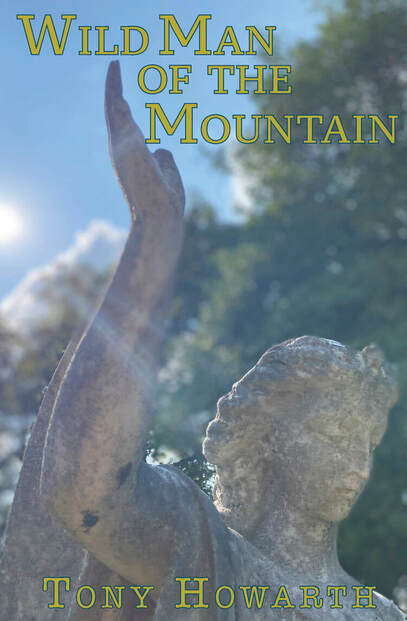|
Wild Man of the Mountain, by Tony Howarth Broadstone Books 2021, 43 pages Reviewed by H.E. Fisher I am of the age and stage in which I am deciding what to keep, what to throw away, give away, or pass on to my children. What has value? Tony Howarth, a playwright, director, and poet, has crafted a lyric that is both a poem and a play. Howarth looks at what beauty can be found in our attics and in our rubble. The titular character is Dag, whose name, Howarth tells us in a Note, is a word that means both someone extraordinary or admirable and is slang for a person who is inept or awkward. Howarth approaches Dag with tenderness, an outsider artist who creates a “dreamland garden” crafted from everyday objects he manifests into beauty; perhaps Dag sees beauty in things to begin with. Dag explains his method to Molly, a waitress he meets in a local coffee shop, who becomes a willing listener and eventual friend. In many ways, Wild Man of the Mountain is a celebration of connections—between the two characters as well the associative nature of a creative mind. Dag understands the connectiveness of stuff; his imagination allows him to repurpose objects. He explains a bit of his process to Molly: oh, oh, oh tear this picture out of this newspaper and I put it put it in the ashtray see how the ashtray now it’s a frame a picture frame that’s what I do I turn ashtrays into picture frames “MOLLY: (don’t call it junk)” [P. 4] Howarth aptly experiments with form throughout the book, playing with space on the page much as Dag so lovingly builds his sculptures from bits and pieces of objects. thunder rain leaks through the roof pummels the window sit here my back to the glass drenched alone listen to trees splinter “DAG: as the tower takes shape” [p.14] Dag shares his perspective in dialog/poetry. Howarth allows his character to speak idiosyncratically, lyrically, as in Dag’s monologue when he addresses his beloved sculpture he calls “Angel”: …go down to the pond kneel at the edge of the water early ancient time reach with my bare hand to scatter the tadpoles and I did it kneeled down my reflection in the immortal stillness of the water my moment of looking at who I am… It is here that Dag declares himself the “wild man of the mountain,” which felt to me when I read it as a kind of Joyceian declaration of self. Dag knows who he is, regardless of labels and other people’s opinions. Molly, with all best intentions, wants Dag to find success, or perhaps how many people might define “success,” by commodifying Dag’s artwork. An art dealer Dag describes as [a] “guy got snakeskin slippers”—a capital A Artworld insider who sees monetary value in Dag’s art—refers to it as “primitive.” Molly says: “…like it’s from a different world where life isn’t so complicated.” [p.26] But life is. And with success comes people, true outsiders. Dag is afraid his work will be treated like junk, fearful that visitors will dismantle and destroy it. “If they tear it apart,” Dag intones, “they tear apart me.” Near the end of the book, Dag’s sculpture, Angel, speaks to his maker, “Most things break, say it.” DAG: most things break. ANGEL: and when they do, you fix ‘em (“DAG: (as if Angel can talk”) [p. 33 ] Howarth’s Wild Man of the Mountain looks at what breaks, what can be fixed, and what cannot, what is worth saving, or repurposed, and how whatever holds us together is often each other, a kind of super glue. H.E. Fisher View the book on Amazon. H.E. Fisher’s first collection, STERILE FIELD (Free Lines Press) and chapbook, JANE ALMOST ALWAYS SMILES (Moonstone Press), are forthcoming in 2022. H.E.’s poetry appears or is forthcoming in Whale Road Review, Indianapolis Review, The Hopper, Miracle Monocle, and Canary, among other publications. H.E. was awarded the 2019 Stark Poetry Prize in Memory of Raymond Patterson at City College of New York and was a finalist in the 2020-21 Comstock Review Chapbook Contest. H.E. is the editor of (Re) An Ideas Journal, and lives in the Hudson River Valley.
0 Comments
Your comment will be posted after it is approved.
Leave a Reply. |
The Ekphrastic Review
COOKIES/PRIVACY
This site uses cookies to deliver your best navigation experience this time and next. Continuing here means you consent to cookies. Thank you. Join us on Facebook:
July 2024
|




